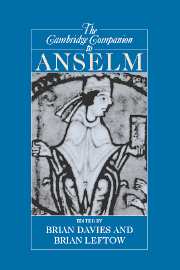Book contents
- Frontmatter
- Introduction
- 1 Anselm’s life, works, and immediate influence
- 2 Anselm on faith and reason
- 3 Anselm, Augustine, and Platonism
- 4 Anselm’s philosophy of language
- 5 Anselm on modality
- 6 Anselm’s perfect-being theology
- 7 Anselm and the ontological argument
- 8 Anselm’s account of freedom
- 9 Anselm on truth
- 10 Anselm on ethics
- 11 Anselm on the Trinity
- 12 Anselm on atonement
- Bibliography
- Index
Introduction
Published online by Cambridge University Press: 28 May 2006
- Frontmatter
- Introduction
- 1 Anselm’s life, works, and immediate influence
- 2 Anselm on faith and reason
- 3 Anselm, Augustine, and Platonism
- 4 Anselm’s philosophy of language
- 5 Anselm on modality
- 6 Anselm’s perfect-being theology
- 7 Anselm and the ontological argument
- 8 Anselm’s account of freedom
- 9 Anselm on truth
- 10 Anselm on ethics
- 11 Anselm on the Trinity
- 12 Anselm on atonement
- Bibliography
- Index
Summary
Anselm of Canterbury is at once one of the best- and least-known of medieval thinkers. Two chapters of his third major work (Proslogion 2 and 3) are almost notorious. Commonly said to contain the first “ontological argument” for God's existence, they are widely read and studied even at the undergraduate level, and they continue to puzzle both atheist and theist philosophers. Yet the rest of Anselm's writings have been less subject to scrutiny. Many philosophers and students of philosophy know little about them, which is regrettable. Anselm had much more to offer about God than a single argument for His existence. And he also had much to say on a range of other topics, some of it still well worth attention.
The purpose of this book is to introduce readers to the range of Anselm’s thinking in a way that will help them to reflect on it for themselves. So, as well as including a chapter on the arguments to be found in Proslogion 2 and 3 (chapter 7), and one on Anselm on God in general (chapter 6), the volume includes accounts of how Anselm thought about a number of other matters. Readers who work seriously through Anselm’s writings will find that he had things to say on matters of religious epistemology, logic, the nature of truth, the reality and significance of human freedom, and the evaluation of human behaviour. In what follows, therefore, readers will find discussions of Anselm covering all these concerns. They will, in addition, find discussions of how Anselm can be situated against his intellectual background, one dominated by the Bible and the writings of St. Augustine (354–430), and of how he applied his mind to questions arising from key Christian doctrines such as the teaching that God is somehow three in one, and the claim that people are saved by virtue of Christ.
- Type
- Chapter
- Information
- The Cambridge Companion to Anselm , pp. 1 - 4Publisher: Cambridge University PressPrint publication year: 2004



